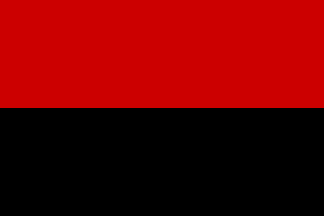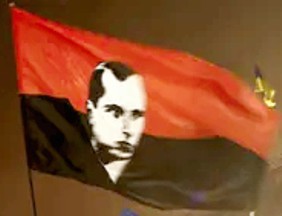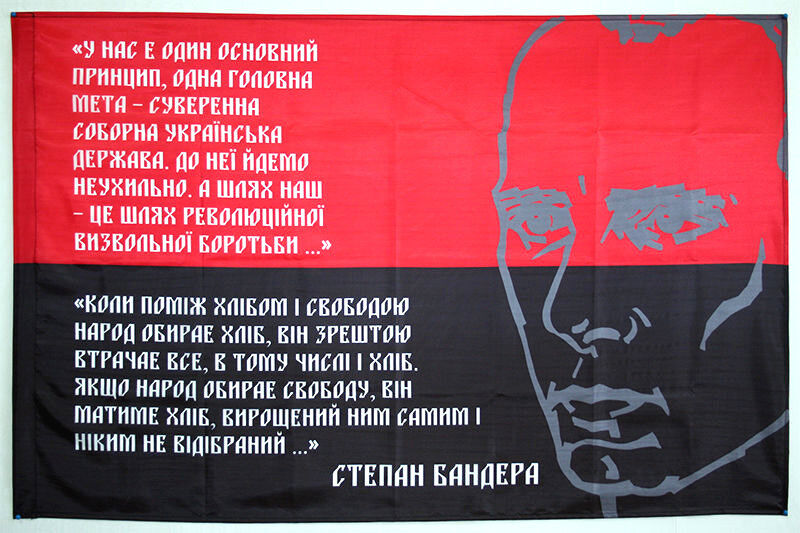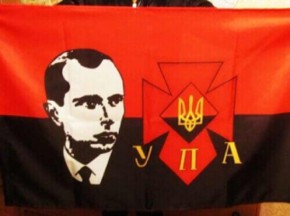 image by BlinxCat
image by BlinxCat
Last modified: 2023-07-29 by martin karner
Keywords: ukraine | sweden | cavalry | sich riflemen legion |
Links: FOTW homepage |
search |
disclaimer and copyright |
write us |
mirrors
See also:
One of the treasures of the Swedish State Trophy Collection in
Stockholm is of Ukrainian origin. It was captured by Swedish
troops near Nieswiez not so far from Grodno (Belarus) in 1706.
One of the leading commanders of Hetman Ivan Mazepa, Colonel
Mychaylo Myklashevski, had before the Swedish-Ukrainian alliance
of 1708 been attached to Russian troops fighting the Swedes on
demand by the Russians. He fell during the skirmish with Swedish
troops.
The very large cavalry standard is 176 centimeters high and with
a varying width from 99 to 264 centimeters. The cloth is of
wine-red silk damask. Of the gilded inscriptions generally only
the impressions remain. On the tongue can be seen a golden double
eagle, surrounded by the initials of the titles of the two
co-reigning brothers, Tsars Ivan and Peter. Down in the lower
part is a medallion with the coat of arm of Mazepa, surrounded by
the initials of his titles as Hetman of the Zaporozhian Kozaks
and another coat of arms, surrounded by the initials M M P
(Mykhaylo Mykalevschky Polkovnik (Colonel in Starodub from 1690).
Also I M G can be seen (Ivan Mazepa Getman).
The chief motif consists of Archangel Michael - the Colonel's
namesake - and a text which in translation runs: "Michael
with his sword will aid the Christians, the time is past when the
Muslims will be victorious over the Christians. Michael will
destroy them as he destroyed the Evil One."
Motifs are painted in different colours, gold and now blackened
silver.
On the reverse of the standard the central motif is the Virgin
and the Holy Child with Mary standing on the crescent of the
moon. The text on this side runs in translation: "The half
moon is the sign of the Ottomans. They wish to conquer the
Christians and defeat them. Mother of Christ, full of grace, has
placed herself above the moon; thereby the hopes of the Turks
have been destroyed."
The large size of the standard is originally a type of medieval
cavalry standard. It was during the 16th and 17th century
replaced by a smaller square standard in Western Europe. This
development, however, occurred around a century later in Russia
and Ukraine. The text relates to the almost continual state of
war between Ukraine, Russia, and the Ottoman Empire. The standard
was probably produced sometime between 1690 - 1696. The Holy
Virgin was the patroness of the Zaporozhian Kozaks of Ukraine.
So it is ironical that a cavalry standard of Sweden's ally
Ukraine was captured by Swedish troops just before the alliance.
Also it was tragic and ironical that Colonel Myklashevski had to
die fighting Swedish troops. The standard and others ought to be
of interest to Ukrainian scholars of military history. Due to
preservation policies standards and banners of the collection at
the Army Museum in Stockholm unfortunately are rarely on display.
But Ukrainian scholars would certainly have access to this
standard and others.
Bertil Haggman, 4 February 1998
At http://www.koza.kiev.ua/img/prapor_uss1.jpg,
one can see image of the
flag (both sides) of Ukrainian Sich Riflemen (U.S.S.) Legion.
There is another image of flag at www.koza.kiev.ua/img/smprapor_uss2.jpg.
Some information in English at /www.koza.kiev.ua/emain.htm.
Dov Gutterman, 25 June 2002
This flag, sometimes seen in the early period of the Russian invasion of
Ukraine in 2022, is clearly that of the Ukrainian Insurgent Army that existed
from 1942 until 1956, they were a Ukrainian nationalist paramilitary and later
partisan formation.
BlinxCat, 25 February 2022
 image located by William
Garrison
image located by William
Garrison
Source: https://www.theguardian.com/world/2015/jan/14/-sp-life-civilians-front-line-ukraine-conflict
Caption: A red/black flag with a portrait of Stepan Bandera, controversial former leader of the WWII-era "Ukrainian Insurgent Army" {UPA} (Ukrainian: Українська повстанська армія, УПА, Ukrayins'ka povstans'ka armiya, abbreviated UPA). Image from a rally in Kiev, Ukraine, on 5 January 2015, marking the 106th anniversary of his birth. Photograph: Nikitin Maxim/Nikitin
Maxim/ITAR-TASS Photo/Corbis
William
Garrison, 17 May 2022
 image located by William
Garrison
image located by William
Garrison
Source: ebay.com
Caption: A red/black flag with unknown white slogans with a facial outline portrait of UPA leader Stepan Bandera; c. 2022.
William Garrison, 17 May 2022
Upper text: "We now have one main principle, one main goal – the Sovereign Cathedral
State of Ukraine. We go steadily towards it. And our path is the path of
revolutionary liberation struggle." (1948)
Lower text: "When the people choose bread between bread and freedom, they ultimately
lose everything, including bread. If the people choose freedom, they
will have bread grown by themselves and not taken away by anyone."
(Google translation provided by Zachary Harden)
 image located by William
Garrison
image located by William
Garrison
Source: https://www.quora.com/What-is-the-red-and-black-flag-in-Ukraine
Caption: a red/black flag of the UPA with a portrait of UPA leader Stepan Bandera and Ukrainian "trident" coat-of-arms; c, 2022.
William Garrison, 17 May 2022
The Ukrainian Insurgent Army (UIA) (Українська повстанська армія, УПА)
was a Ukrainian nationalist paramilitary force founded by the national fascist Organization of Ukrainian Nationalists.
During World War II, they engaged in guerrilla warfare against Soviet invaders, Communist Polish invaders, and Nazi German invaders, trying to rid Ukraine of all
outsiders and establish self-rule. Unfortunately, they are still trying.
The top flag text of "Слава Україні!" translates as "Glory to Ukraine!"
However, I'm not sure what the phrase on the bottom is, but "Слава!" is "Glory!" in Ukrainian
(source). – Because of the current Russian Federation's intrusion into the Ukraine
commentative flags such as this have become increasing popular.
Pete Loeser, 24 July 2023 (2x)
The text on the bottom says "Glory to the Heroes!" (Heroiam slava!).
Zachary Harden, 24 July 2023
The flag of the Ukrainian Insurgent Army was a plain red-black
bicolor. The variants charged with additional symbols, such as the one
presented here, are modern derivations, some of which being already
presented on this page.
Tomislav Todorovic, 24 July 2023